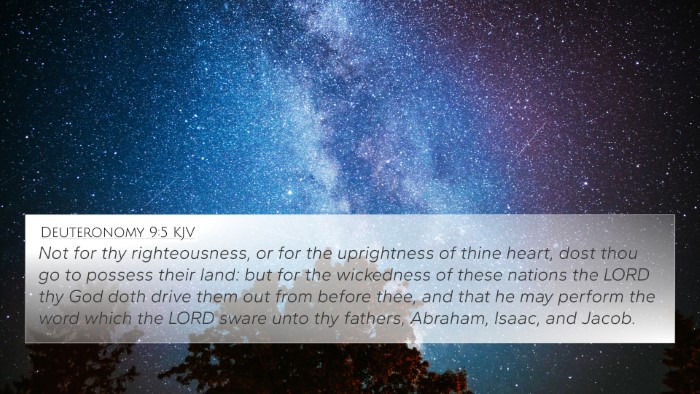Ezekiel 36:32 - Overview and Meaning
Ezekiel 36:32 states: "Not for your sakes do I this, saith the Lord God, be it known unto you: be ashamed and confounded for your own ways, O house of Israel." This verse emphasizes God's sovereign decision to restore Israel, highlighting His mercy rather than the merit of the people.
The commentary on this verse reveals several important themes, notably the notions of divine grace and the futility of human efforts in achieving righteousness. In analyzing this verse, biblical scholars such as Matthew Henry, Albert Barnes, and Adam Clarke contribute their insights on the spiritual significances embedded in God's message through Ezekiel.
Commentary Insights
-
Matthew Henry:
Henry emphasizes the unmerited nature of God's blessings, asserting that the restoration of Israel is solely for God's glory and not because of their righteousness. He insists on the importance of acknowledging one's failures to foster true repentance.
-
Albert Barnes:
Barnes speaks to the call for self-awareness among the Israelites. He interprets God's statement as a rebuke, encouraging the people to recognize the depth of their sins. His analysis indicates that genuine humility is necessary for receiving God's mercy.
-
Adam Clarke:
Clarke highlights the significance of the phrase "Not for your sakes" to illustrate God's compassion. He interprets this as a furtherance of God's covenant, stressing that Israel should not take God's grace for granted but rather reflect on their previous iniquities.
Thematic Connections
Ezekiel 36:32 serves as a profound reminder of God's unchanging character and His commitment to His people. This verse connects with various other scriptures that reinforce themes of grace, repentance, and divine restoration. Below are several cross-references that enrich our understanding of this key verse:
- Deuteronomy 9:5: Highlights that Israel's inheritance in the land is not due to their righteousness but to God's covenant promises.
- Isaiah 43:25: God speaks of blotting out transgressions for His own sake, mirroring the sentiment in Ezekiel.
- Romans 9:16: Emphasizes that God's mercy is not dependent on human will or effort, paralleling the themes of grace in the Old Testament.
- Jeremiah 31:34: Discusses the new covenant God establishes with His people, recognizing their need for forgiveness.
- Ephesians 2:8-9: Affirms that salvation is a gift of grace, not resulting from works, echoing the ethos of Ezekiel's message.
- Philippians 1:6: Speaks to God's promise to complete the good work He began in believers, showing commitment beyond their failures.
- 1 Peter 5:5-6: Encourages humility and reliance on God’s grace, aligning with the message of recognizing sins in Ezekiel.
Inter-Biblical Dialogue
Ezekiel 36:32 encourages believers to engage in reflective practices, understanding the interconnectedness of Scripture. This verse calls for thematic Bible verse connections and scriptural cross-referencing to fully grasp the weight of God's proclamations throughout the Biblical narrative.
By studying this verse through the lenses of Biblical scholars and their insights, one can appreciate the depth of God's grace and the necessity for human humility and acknowledgment of sin. The transformative power of repentance leads to restoration, as evidenced in both Old and New Testament teachings.
Conclusion
In summary, Ezekiel 36:32 stands as a vital reminder of the nature of divine grace and the necessity for humility among believers. The verse is underpinned by a variety of interconnected scriptures that provide a broader context for understanding God's plan for Israel and, by extension, His chosen people today. Through careful study and cross-referencing, we can uncover the layers of meaning within this powerful prophetic word and apply its teachings to our spiritual lives.











